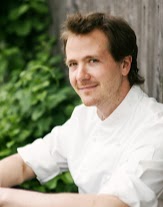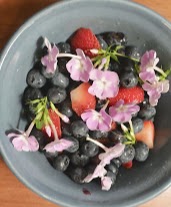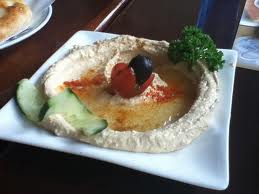Are you curious to know more about the chef behind your most beloved cookbook, recipe or restaurant? If yes, then you’ll love this new blog. Each month we’ll ask one of our favorite chefs about their motivations, their inspirations, and their own family dinners. We’ll also nudge them to offer up tips and ideas from their restaurant and personal experience that you can use in your home kitchen.
 Geoff Lukas is currently Chef de Cuisine at Sofra Bakery and Café, a Middle Eastern restaurant in Cambridge, Massachusetts. The name ‘Sofra’ comes from Turkey and is synonymous with generosity and hospitality. “At its heart,” explains the Sofra web site, “it’s a word about sharing and enjoying the unique bounty that comes only from community.” In the interview that follows you’ll see that this is what rings true to Chef Geoff’s heart as well.
Geoff Lukas is currently Chef de Cuisine at Sofra Bakery and Café, a Middle Eastern restaurant in Cambridge, Massachusetts. The name ‘Sofra’ comes from Turkey and is synonymous with generosity and hospitality. “At its heart,” explains the Sofra web site, “it’s a word about sharing and enjoying the unique bounty that comes only from community.” In the interview that follows you’ll see that this is what rings true to Chef Geoff’s heart as well.
What does one do as Chef de Cuisine?
So this means I’m in charge of the savory items at the restaurant. I get to come up with various mezze, sandwiches like the sabich, and prepared foods like cabbage dolmas, for example. I try to make them the best they can be by playing around with flavors and techniques.
Sounds fun. How did you get this role?
I’ve learned a lot from other chefs I’ve worked with and for. But I also try to travel a lot. For instance, I spent two weeks in Israel and discovered they have the most incredible chickpeas and hummus there. It’s very humbling. Unfortunately, Israeli cooks are almost territorial about their hummus, so if you ask for the recipe, they’ll just say “love is the secret ingredient”…and things like that. But I don’t mind, because the problem solving and creativity aspects that come with cooking are my favorite parts. I was a physics major undergrad and now, as a cook, I want to go and taste the best versions of whatever foods I’m interested in, and then try to figure out and reconstruct those foods using the principles I’ve learned about food. For example, after this experience abroad, I spent four months making hummus twice a day to try get it as good as the hummus in Israel.
So can you give our readers any tips about making the best hummus?
First, find the highest quality chickpeas you can; Turkey and Israel have the highest quality but they don’t export their chickpeas so you have to do what you can. What you want to do is get rid of the skin. The skin makes hummus gritty. Then cook the chickpeas very slowly and let them cool just enough so you can stick your hands in the water and massage the skin off. Getting rid of the skin makes all the difference in the world.
You mentioned you studied physics first. When did you realize you wanted to be a chef?
During high school and college I did some cooking, working at fairly low-end places flipping burgers and making crepes and such. Eventually I realized that I had a very naïve idea when I went into physics; I had this idea that I was going to do something very dramatic and meaningful. But then I discovered that being in front of a computer all the time wasn’t fulfilling for me. I realized that what I really enjoyed was kitchen culture. It wasn’t about the food at first, but about the physical engagement of working on the line and working with other cooks. This made me happy. So I made a decision to go to the Culinary Arts program at the Art Institute of Philadelphia. Then I started working my way up through restaurants in Philadelphia, cutting my teeth on the higher end of things.
Eventually, I was offered an under-the-table position in Provence in the south of France. I worked doubles six days a week. The food was great and the lifestyle was really incredible. This experience stuck with me. I realized then that working with food really makes me happy and that as a chef, I could have a fair degree of creative freedom. I like how tangible it all is (vs. physics, my original academic pursuit). With food it’s either good or it’s not. You get to eat it and decide.
What did food mean for you growing up? Is there any food that takes you back?
There were a few dishes that my mom made that I really enjoyed, like chicken and dumplings. But we ate out a lot, which meant a lot of boxed foods and comfort foods. What stands out for me more than the family dinners growing up were the dinners I had when I was in in college. I never went home for holidays and I had a lot of foreign friends and together we’d have these “orphan” Thanksgivings. We’d cook for each other and I have very fond memories of that. It was just another kind of family.
So what does the phrase “family dinner” conjure up for you?
When I first moved to Boston I was dating someone and I went to her house for Thanksgiving. Her family was going through some difficulties. I took the lead and cooked dinner for them. As an adult I’ve had some deeply meaningful times over food. In Hebrew, when you ask someone to go get hummus with you, you actually say ‘do you want to go wipe hummus?’ You use pita to wipe hummus out of the bowl. This is a form of breaking bread. Similarly, in the right context, food can break barriers and help you open up with other people in a way you might not in other circumstances. I’m not sure why this is, but I can honestly say that although I tend to be a guarded person, when I’m with people I trust and we sit down to eat, I can open up more.
Can you describe a really memorable meal you’ve had with other people who are your “family?” People who make you feel like you are at home?
When I was 20 years old I studied physics abroad in Budapest. It was my first time out of the country. Sounds sort of cliché, but it’s true, that this experience of living abroad had a dramatic effect on how I looked at the world. I made these two friends who were very much a part of that transformation. Later, when I was living in Philly, they came to visit me. I was in culinary school at the time and although it took me six days, I made this huge spread of food–carnitas, a whole pork shoulder, a half dozen kinds of salsa , fresh tortillas–a six-foot-table full of food from one end to the other! It was a great time, eating and telling stories to each other and I know they enjoyed it. For me it was really special…not just being with them again, but the act of preparing all that food for them. I think I was trying to tell them how much their friendship meant to me.
You teach a class about cooking with flowers. Can you say a little bit about the process of cooking with flowers? How did you learn to do this?
 There’s a complexity and delicacy to working with flowers that I find fascinating. It’s really a lot about balance. Say you’re working with saffron or something of that nature. You slap it in and you get neon yellow rice or ice cream and all the delicacy is lost. It tastes metallic or like perfume. Or sometimes the flower is overpowered by something else. There is very small window in which you can properly represent a flower in a dish. You even need to consider how much heat you apply, and when you incorporate the flower. Every decision you make has to be very purposeful. Everything has meaning.
There’s a complexity and delicacy to working with flowers that I find fascinating. It’s really a lot about balance. Say you’re working with saffron or something of that nature. You slap it in and you get neon yellow rice or ice cream and all the delicacy is lost. It tastes metallic or like perfume. Or sometimes the flower is overpowered by something else. There is very small window in which you can properly represent a flower in a dish. You even need to consider how much heat you apply, and when you incorporate the flower. Every decision you make has to be very purposeful. Everything has meaning.
So this could be quite intimidating for a very hurried home cook?
There are some relatively simple recipes, things like this scallops with herb flower salad recipe, for instance. When I talk about it being difficult, I’m talking about restaurant quality dishes. Really getting it right is difficult but in the context of just having fun or as a hobby, it’s approachable.
I know you were part of the Harvard University Science and Cooking for Kids camp program. Can you talk briefly about that?
I taught there the last two summers. The kids they let into the program are just great. It was really heartening to be in the room with these people. No showmanship… just genuine wonder.
How do you get kids involved/excited about cooking? Any tips?
Depends what sort of tact you might want to take. You can pose cooking as an experiment you can perform. All the same sort of guidelines for science hold for cooking. So it’s an experiment and then you can eat it at the end. Baking in particular tends to be very engaging and the steps involved are all very physical, e.g. mixing, the weighing, and cracking eggs. Kids seem to have a lot of natural interest.
And do you have any general tips for our adult home cooks?
In the kitchen, anything goes. Just take a deep breath and have fun with it, keeping in mind basic safety guidelines, of course. Look at recipes for inspiration. Enjoy the experience. If you start to get anxious it often comes through in the food. Even if you make a mistake, if you’re enjoying yourself, the end result tends to work out better.
Hummus Image via

